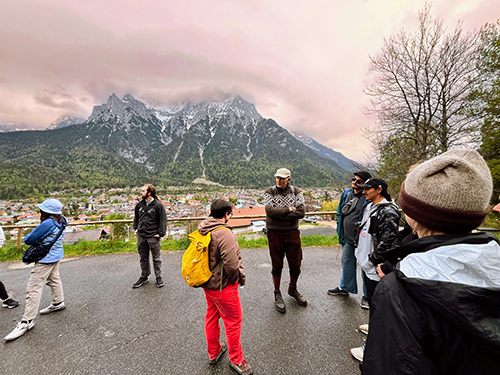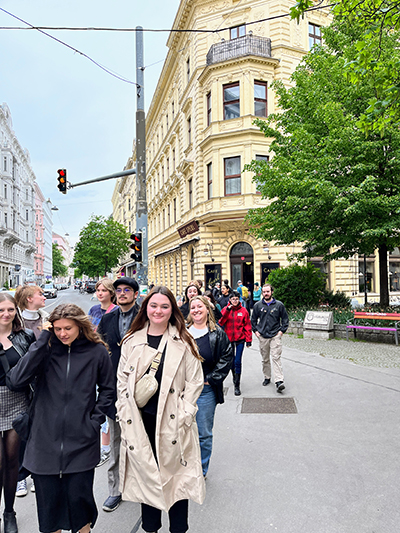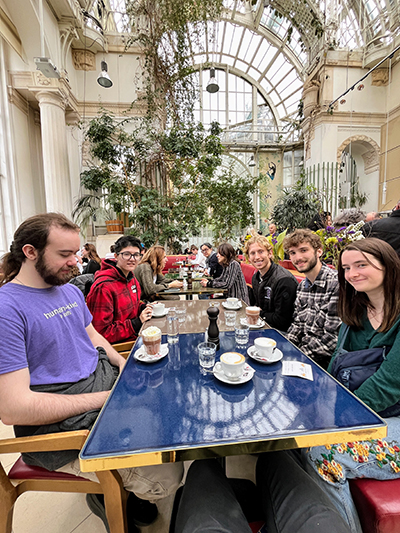Note: This is a guest article written by Tyler Carrington. Carrington is an associate professor of German Studies at Cornell College. He took students off campus for a course in Germany during the spring of 2024.
 Picture this moment: on a drizzly, overcast day, a group of intrepid Cornell students make their way up an almost impossibly steep slope out of the town of Mittenwald, deep in Bavaria, in the shadow of the Zugspitze. Through a thick cloud of aromatic pipe smoke, they follow their Alpine leader, clad in Lederhosen and a jaunty cap, up switchbacks and in search of the Korbinianhütte, where—they’ve been told—a hot, mountaintop repast awaits them.
Picture this moment: on a drizzly, overcast day, a group of intrepid Cornell students make their way up an almost impossibly steep slope out of the town of Mittenwald, deep in Bavaria, in the shadow of the Zugspitze. Through a thick cloud of aromatic pipe smoke, they follow their Alpine leader, clad in Lederhosen and a jaunty cap, up switchbacks and in search of the Korbinianhütte, where—they’ve been told—a hot, mountaintop repast awaits them.
Then the wind changes, the pipe smoke clears, and they hear their guide telling them to slow down, smell the roses (or mountain herbs, in this case), and soak in their pristine surroundings.
You will be forgiven for assuming the guide here was Cornell College’s own Herr Professor Tyler Carrington because, absent the pipe, he normally was out front of the group in this way on their trip to Germany and Austria in the spring of 2024. But the Lederhosen-wearing, pipe-smoking, mountain sensei in this case was Professor Hans-Peter Söder, a native Alpinist and founder of the European Alpine Academy, who was hired for the day to enliven the topic of German ecology and mountaineering for the Cornell students on Carrington’s study abroad course, Investigating German-Speaking Pasts and Presents. 
Practically every student later reported that this moment—pipe smoke and all—was a favorite of the course. But there were also many others: the factory tour of Bavarian Motor Works in Munich, with sparks from robot welders flying everywhere as Carrington told the story of how his great-grandfather-in-law, Rolf Ammann (then the head of BMW’s aviation motor division) had been told to arm the remaining plant employees for battle with approaching Allied soldiers in April 1945 and instead sent them home and peacefully surrendered the BMW factory, saving hundreds of lives.
Or the bespoke coffeehouse tour that Carrington led across Vienna and over gourmet cups of its famed Melange and Verlängerter brews, during which he detailed the birth of coffeehouse culture as a result of trade and the movement of diplomats between Vienna and Constantinople . At each of the tour’s three stops students had little trouble leaning into the slow pace of the urban, cultured, epicurean lifestyle the tour brought to life.
Or, in Berlin, the at once thrilling and chilling experience of wandering the 1970s-era, bureaucratic labyrinth of Stasi offices and interrogation rooms at the erstwhile headquarters of East Germany’s euphemistically-titled Ministry for State Security (Staatssicherheit; shortened: Stasi), where the other Cornell faculty member on the trip, instructor of German Ulrike Carlson, recounted her own experiences growing up in East Germany and learning to avoid, misdirect, and cope with the surveillance state the Stasi and its several hundred thousand “inoffizielle Mitarbeiter,” or unofficial informants embodied.
 Or perhaps it will be the unplanned, in-between moments that linger in the minds of Cornell students, nearly all of whom were abroad in Europe for the first time in their lives. One student successfully navigated her way, in German, through the high-stakes experience of being “kontrolliert” (checked for a transit ticket by a uniformed officer). Another group of students—current star distance runners for the Cornell cross-country team—joined Carrington each morning for runs through Munich’s English Garden, Berlin’s Tiergarten central park, around Vienna’s historic Ringstraße boulevard, and even for a half-marathon through the Prater park in a slightly slower re-creation of Eluid Kipchoge’s famous sub-two-hour marathon effort. A musical theater major reported having the time of her life taking in Don Giovanni at the Vienna State Opera. Another group of students made a podcast about locating the very best “Berliner” doughnut in the German capital.
Or perhaps it will be the unplanned, in-between moments that linger in the minds of Cornell students, nearly all of whom were abroad in Europe for the first time in their lives. One student successfully navigated her way, in German, through the high-stakes experience of being “kontrolliert” (checked for a transit ticket by a uniformed officer). Another group of students—current star distance runners for the Cornell cross-country team—joined Carrington each morning for runs through Munich’s English Garden, Berlin’s Tiergarten central park, around Vienna’s historic Ringstraße boulevard, and even for a half-marathon through the Prater park in a slightly slower re-creation of Eluid Kipchoge’s famous sub-two-hour marathon effort. A musical theater major reported having the time of her life taking in Don Giovanni at the Vienna State Opera. Another group of students made a podcast about locating the very best “Berliner” doughnut in the German capital.
“This course is part of my larger attempt to leverage what I think is the greatest power of the block plan–namely the ability seamlessly to integrate off-campus adventures into our students’ college experiences and take students to exciting and perspective-altering places in German-speaking Europe, whether they speak German fluently or not at all,” Carrington said.
This spring 2024 trip was the second that Carrington has led to this trio of cities, and another—to the German-speaking Alps—is scheduled for Block 1 during the fall of 2025. That course, The Alps: Culture, Economy, and Ecology, will attempt to recreate the majesty of that Mittenwald moment (remember the pipe smoke and Lederhosen?) by focusing entirely on the mountains and how Alpine culture, environment, and artisanry cohere various national cultures around the Alps themselves. Traveling to Innsbruck, Austria; Bolzano, Italy; and Interlaken, Switzerland, the course will have about a dozen seats open for Cornell students of all academic interests. Carrington says that he also hopes to offer a similar experience for Cornell alumni in future summers.
All photos courtesy of Tyler Carrington.